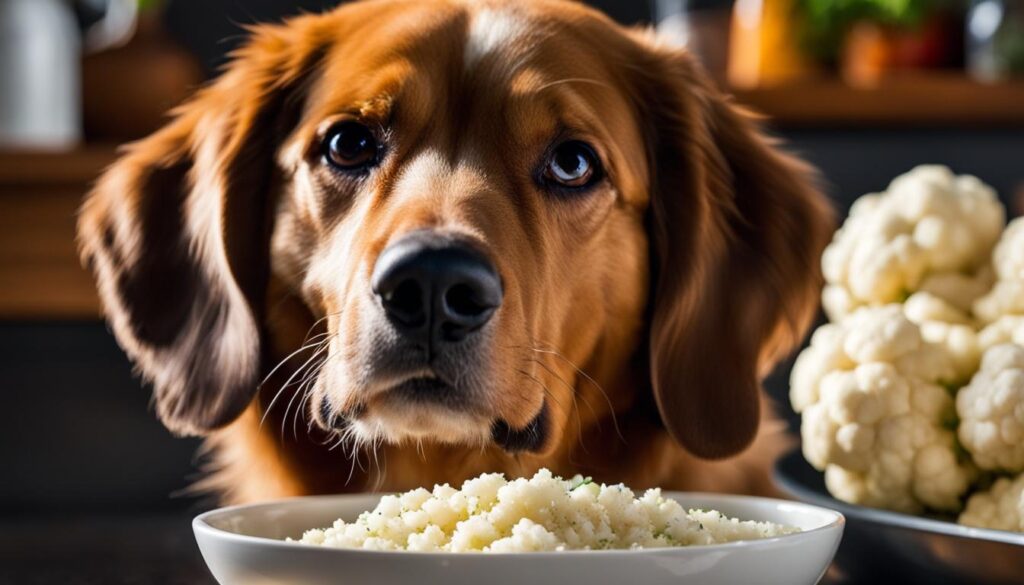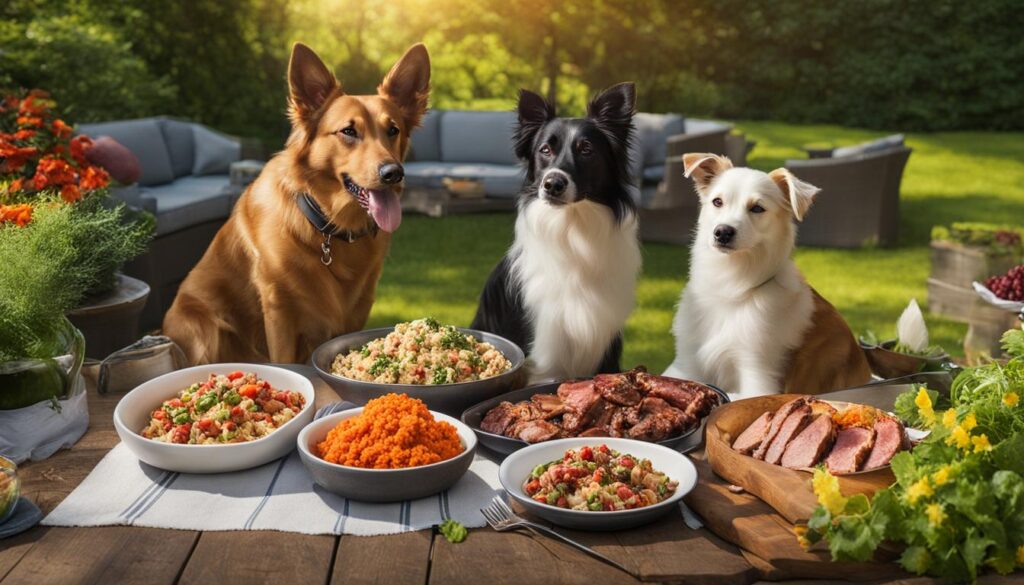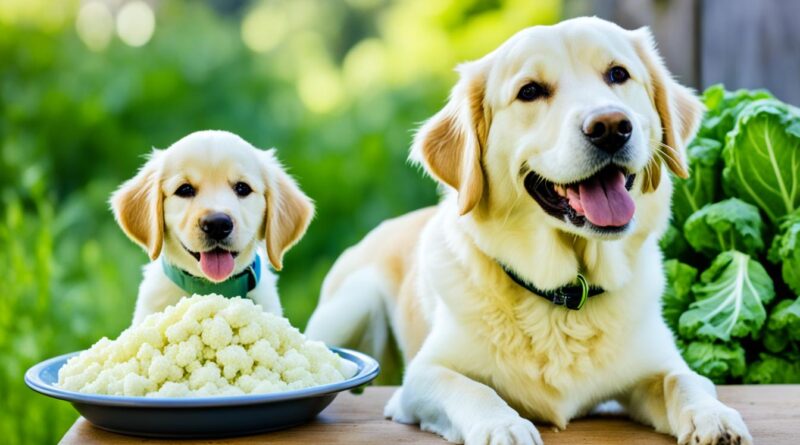Can Dogs Eat Cauliflower Rice? Vet Insights
If you’re a dog owner, you may have wondered if cauliflower rice is a safe and healthy option to include in your furry friend’s diet. In this article, we’ll explore whether dogs can eat cauliflower rice and what you need to know before introducing it into their meals.
Key Takeaways:
- Dogs can safely eat cauliflower rice in moderation.
- Cauliflower rice provides dietary fiber, vitamins, and minerals beneficial to dogs.
- Avoid seasoning or adding oils to cauliflower rice for dogs.
- Overconsumption of cauliflower rice can cause gas and bloating in dogs.
- Always consult with a veterinarian before adding new foods to your dog’s diet.
The Nutritional Benefits of Cauliflower for Dogs
Cauliflower is a versatile vegetable that offers numerous nutritional benefits for dogs. It is rich in essential nutrients and can be included as part of a well-balanced diet. Here are some of the key nutritional benefits of cauliflower for dogs:
Fiber for Digestive Health
Cauliflower is an excellent source of dietary fiber, which plays a crucial role in maintaining a healthy digestive system for dogs. Fiber helps regulate bowel movements and promotes optimal digestion, reducing the risk of stomach issues, constipation, and diarrhea.
Vitamins and Minerals
Cauliflower is packed with vitamins and minerals that are essential for a dog’s overall health and wellbeing. It is a good source of vitamin K, which is vital for blood clotting and bone metabolism. Additionally, cauliflower contains vitamin C, vitamin A, beta-carotene, and folate, all of which strengthen the immune system and help prevent certain diseases.
Antioxidants for Immune Support
Cauliflower contains antioxidants that help fight against harmful free radicals and provide anti-inflammatory properties. These antioxidants support the immune system, promoting optimal health and protecting against various diseases.
Phytonutrients with Anti-Cancer Properties
Phytonutrients, such as glucosinolates and isothiocyanates, are present in cauliflower and have been shown to slow the growth of cancer cells and reduce the risk of heart disease and cognitive aging in dogs.
Essential Minerals
Not only is cauliflower rich in vitamins, but it also provides essential minerals that support various bodily functions in dogs. These minerals include potassium, calcium, magnesium, and manganese, which are necessary for healthy muscle and nerve function, strong bones, and overall wellbeing.
Overall, cauliflower offers a wide range of nutritional benefits for dogs. It is a nutrient-dense vegetable that provides fiber, vitamins, minerals, antioxidants, and phytonutrients. Including cauliflower in a dog’s diet can contribute to better digestion, a stronger immune system, and overall optimal health.
| Nutrient | Amount per 100g of Cauliflower |
|---|---|
| Dietary Fiber | 2.8g |
| Vitamin K | 15.5μg |
| Vitamin C | 48.2mg |
| Vitamin A | 0.1μg |
| Beta-carotene | 0.07mg |
| Folate | 57μg |
| Potassium | 299mg |
| Calcium | 22mg |
| Magnesium | 15mg |
| Manganese | 0.2mg |
Please note that the nutritional content may vary slightly depending on the size and variety of cauliflower.
Risks and Precautions of Feeding Cauliflower to Dogs
While cauliflower can be a healthy addition to a dog’s diet, it is important to be aware of the risks and take necessary precautions. Here are some factors to consider when introducing cauliflower to your furry friend:
- Gastrointestinal Discomfort: Cauliflower is known for its high fiber content, which can cause stomach upset and gastrointestinal discomfort in dogs if consumed in large amounts. It is advisable to start with small quantities of cauliflower and gradually increase it to monitor your dog’s reaction. If any signs of stomach or intestinal problems are observed, consult your veterinarian.
- Choking Hazards: Chopping cauliflower into small pieces is crucial, especially for small dogs and puppies, to minimize the risk of choking. Always supervise your dog while it is eating cauliflower to ensure its safety.
- Unseasoned Serving: It is essential to serve cauliflower to dogs plain and unseasoned. Seasonings, onions, and garlic can be toxic to dogs and should be avoided.
Consulting with a veterinarian before introducing any new food to your dog’s diet is highly recommended. They can provide personalized advice based on your dog’s specific needs and dietary requirements.
| Concerns | Precautions |
|---|---|
| Gastrointestinal Discomfort | Start with small quantities and monitor your dog’s reaction. Consult a veterinarian if any issues arise. |
| Choking Hazards | Cut cauliflower into small pieces and supervise your dog while it is eating. |
| Unseasoned Serving | Avoid seasonings, onions, and garlic. Serve cauliflower plain and unseasoned. |
Note: Always consult with a veterinarian before introducing any new food into your dog’s diet.
How to Safely Serve Cauliflower to Dogs
When it comes to serving cauliflower to dogs, safety should be a top priority. Following certain guidelines will ensure that your furry friend can enjoy cauliflower without any health risks. Here are some tips on how to safely serve cauliflower to dogs:
- Boiling, steaming, roasting, mashing, or ricing cauliflower before serving can make it easier for dogs to digest and reduce the risk of choking.
- Raw cauliflower can be given as an occasional treat in small amounts, but larger quantities may lead to digestive problems or gas.
- Serve cauliflower as a standalone treat rather than mixing it with regular dog food. It’s best to limit cauliflower to once a week in your dog’s diet.
- Avoid adding any onions, garlic, fats (like butter), or seasonings to the cauliflower, as these ingredients can be harmful to dogs.
If you’re unsure about the best way to serve cauliflower to your dog or have any concerns, it’s always a good idea to consult with your veterinarian for personalized advice.
Now, let’s take a look at some dog-friendly cauliflower rice recipes that your furry friend will love:
Dog-Friendly Cauliflower Rice Recipes
| Recipe | Ingredients | Instructions |
|---|---|---|
| Veggie Delight | Cauliflower rice, carrots, peas, green beans | 1. Steam the cauliflower rice. 2. Cook the carrots, peas, and green beans until soft. 3. Mix the cooked vegetables with the cauliflower rice. 4. Serve the veggie delight to your dog. |
| Chicken and Cauliflower Medley | Cauliflower rice, cooked chicken, sweet potatoes | 1. Cook the cauliflower rice until soft. 2. Dice the cooked chicken and sweet potatoes into small pieces. 3. Mix the cauliflower rice, chicken, and sweet potatoes together. 4. Serve the chicken and cauliflower medley to your dog. |
These delicious recipes provide a healthy and dog-friendly way to incorporate cauliflower into your dog’s diet. Remember to always introduce new foods gradually and observe your dog for any adverse reactions. Enjoy cooking and bonding with your four-legged companion!

Other Safe Fruits and Vegetables for Dogs
While cauliflower is safe and nutritious for dogs, there are also other fruits and vegetables that can be included in their diet. Apples, bananas, blueberries, cantaloupe, cranberries, mangoes, oranges, pears, pineapples, raspberries, strawberries, and watermelon are all safe for dogs and provide various health benefits.
When feeding fruits and vegetables to dogs, it is important to remove any seeds, peels, or pits, and avoid giving them in large quantities due to the high sugar content.
Fruits Safe for Dogs:
- Apples
- Bananas
- Blueberries
- Cantaloupe
- Cranberries
- Mangoes
- Oranges
- Pears
- Pineapples
- Raspberries
- Strawberries
- Watermelon
Vegetables Safe for Dogs:
- Asparagus
- Broccoli
- Brussels sprouts
- Carrots
- Celery
- Cucumber
- Green beans
- Peas
- Pumpkin
- Spinach
- Sweet potatoes
- Zucchini
It is always necessary to consult with a veterinarian before introducing any new food into your dog’s diet to ensure it is safe and appropriate for your specific dog’s health needs.
Meat Options for Dogs
When it comes to including meat in a dog’s diet, it is essential to consider the type of meat and how it is prepared. Dogs can safely eat certain lean cuts of meat, as long as they are cooked thoroughly and free of any seasoning or additives. Beef and chicken are two popular options that provide dogs with essential protein and nutrients.
Beef is a great source of high-quality protein for dogs. It is important to choose lean cuts such as sirloin or ground beef with low fat content. Trim off any excess fat before cooking to avoid weight gain and potential digestive issues for your dog. Cook beef thoroughly, ensuring there is no pink or raw meat left, as raw or undercooked beef may contain harmful bacteria or parasites that can affect your dog’s health. Feeding cooked beef in small portions as a part of a balanced diet can offer nutritional benefits to your furry companion.
Chicken is another safe meat option for dogs. It is vital to use boneless and skinless chicken breasts or thighs for your dog’s meals. Remove any visible fat from the chicken before cooking, as excessive fat can lead to weight gain in dogs. As with beef, cook chicken until it is fully cooked and there is no pink or raw meat remaining. Avoid seasoning the chicken with any spices, herbs, or seasoning mixes, as they may contain ingredients that can be harmful to dogs. Cooked plain chicken is a healthy choice that can provide essential nutrients, such as protein and amino acids, for your dog.

TIP: Remember to remove any bones from the meat before feeding it to your dog. Cooked bones can splinter and cause serious injuries or blockages in the digestive system.
Eggs are another protein-rich food that can be included in your dog’s diet. They are a complete source of amino acids and essential fatty acids, benefiting your dog’s overall health. It is recommended to cook eggs thoroughly before feeding them to your dog, as raw eggs may contain salmonella, a bacteria that can be harmful to dogs. Scrambled or boiled eggs without any seasoning are safe and nutritious options that can be a tasty addition to your dog’s meals.
When offering meat to your dog, it is crucial to avoid excessive fat content, as it can lead to weight gain and obesity. Additionally, it’s important to note that meat should be given in moderation and should not replace a balanced commercial pet food diet. Consult with your veterinarian to determine the appropriate amount and frequency of incorporating meat into your dog’s diet.
Conclusion
Can dogs eat cauliflower rice? The answer is yes, but with some precautions. Cauliflower is safe for dogs to consume in moderation and offers a variety of nutritional benefits. It is a great source of fiber, vitamins, minerals, antioxidants, and phytonutrients that support overall health and the immune system. However, it is important to be mindful of potential choking hazards and gastrointestinal discomfort.
When serving cauliflower to dogs, it is crucial to keep it plain and unseasoned. Onions and garlic should be avoided as they can be harmful to dogs. It is best to consult with a veterinarian before introducing any new food into your dog’s diet, including cauliflower rice. They can provide personalized advice based on your dog’s specific needs and health conditions.
Remember, a balanced and varied diet is key to your dog’s well-being. While cauliflower can be a healthy addition, it should not replace a complete and balanced commercial pet food diet. With proper precautions and guidance from your veterinarian, you can safely incorporate cauliflower rice as an occasional treat for your furry friend.
FAQ
Can dogs eat cauliflower rice?
Yes, dogs can eat cauliflower rice in moderation.
Is cauliflower rice safe for dogs?
Cauliflower rice is safe for dogs as long as it is served plain and unseasoned.
What are the nutritional benefits of cauliflower rice for dogs?
Cauliflower rice is a source of dietary fiber, vitamin K, and vitamin C for dogs.
What are the risks and precautions of feeding cauliflower rice to dogs?
Overconsumption of cauliflower rice can cause gas and bloating in dogs, and caution should be exercised to prevent choking hazards, especially for small dogs and puppies.
How should I safely serve cauliflower rice to my dog?
Cauliflower rice should be boiled, steamed, roasted, mashed, or riced before serving to make it easier to digest. It is recommended to cut it into small pieces and avoid adding any seasonings or oils.
Can dogs eat other fruits and vegetables?
Yes, there are many other fruits and vegetables that are safe for dogs to eat, including apples, bananas, blueberries, carrots, and green beans.
Can dogs eat meat?
Yes, dogs can eat lean cuts of meat such as beef and chicken, as long as they are cooked and free of seasoning.
Is cauliflower rice a healthy addition to a dog’s diet?
Cauliflower rice can be a healthy addition to a dog’s diet, providing fiber, vitamins, minerals, antioxidants, and phytonutrients. However, it should be fed in moderation and with caution to prevent digestive problems and choking hazards.


